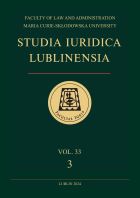Obligation to Keep Professional Secrecy vs.
the Need (Possibility) to Disclose the Circumstances
Covered by It by the Advocate/Attorney-at-Law
Obligation to Keep Professional Secrecy vs.
the Need (Possibility) to Disclose the Circumstances
Covered by It by the Advocate/Attorney-at-Law
Author(s): Arkadiusz BerezaSubject(s): Sociology of Law
Published by: Wydawnictwo Naukowe Uniwersytetu Marii Curie-Sklodowskiej
Keywords: professional secrecy; attorney-at-law; advocate; state of necessity; right to court; right of defence;
Summary/Abstract: Issues regarding the scope of professional secrecy and the obligation to keep it by the advocate or attorney-at-law are currently the subject of debate in the Polish legal community. This is due to both the fundamental importance of professional secrecy for the correct practice of the legal professions of advocate (Pol. adwokat) or attorney-at-law (Pol. radca prawny), as well as the inconsistency of the statutory provisions and the relationship of these provisions to the deontological regulations. The breach of the obligation of professional secrecy entails criminal and/or disciplinary liability. At this point, a problem arises concerning the disclosure of facts covered by professional secrecy by an advocate/attorney-at-law in the situation of a civil dispute with a former client or charges brought against the advocate/attorney-at-law in criminal or disciplinary proceedings for reasons related to the legal assistance previously provided. In such a situation, disclosure of information covered by professional secrecy – to the extent, of course, required by necessity – does not constitute a criminal offence (disciplinary offence) of an advocate/attorney-at-law due to the fact of acting under the state of necessity in order to save a higher-value good such as the right to court or the right of defence, respectively. Moving away from this complex construct and strengthening the standards of liability by striving for maximum definiteness of the prohibited act speak for making statutory amendments to indicate the specific behaviours of an advocate/attorney-at-law that do not constitute a breachof professional secrecy. Despite the ongoing work and accompanying analyses carried out in legal professional self-government organisations, none of them has so far decided to propose such a bold legislative change officially.
Journal: Studia Iuridica Lublinensia
- Issue Year: 33/2024
- Issue No: 3
- Page Range: 9-29
- Page Count: 21
- Language: English

